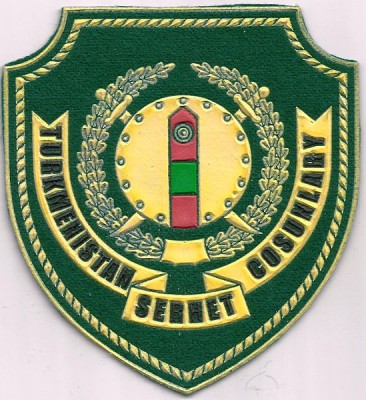On February 26, 2014, a group of Afghanistan-based militants, reportedly linked to Taliban, attacked a border patrol in northern Turkmenistan, killing at least three border guards. Although Turkmen diplomats in Afghanistan confirmed the report, state-controlled media in Turkmenistan has not mentioned the incident.
The attack became a hot topic for online discussion. Many netizen reactions reflected the facts that that was the first alleged Taliban attack on the country and that Ashgabat chose to remain silent about the incident.
On the Vienna-based opposition blog Chronicles of Turkmenistan, visitors discussed threats that the country is facing from Afghanistan-based militants. Alarmed by the attack, Dengli suggested [ru] that the country's policy of “permanent neutrality” provided the country with a measure of protection that Turkmenistan's weak military could not be trusted to provide:
Считаю позицию наших официальных властей В данной читуации пожалуй единственно верной. О боеспособности нашей армии говорить не буду она всем известна, поэтому фиговый листок нашего нейтралитета тут конечно сыграет определенную роль. Однако его защитная роль очень кратковременная и очень ненадежная.
I believe that the position that the [Turkmen] officials have taken in this situation is right. Everybody knows the condition of our military; there is no need to mention it here. That is why the [protection] provided by our neutrality will play a certain role in this situation. However, this protection is not long lasting or very reliable.
One netizen criticized [ru] the authorities for providing Turkmenistan's airspace for US and NATO forces fighting in Afghanistan and thus making the country a target of Taliban attacks. Another netizen, however, did not believe that militants from Afghanistan posed any threat. He blamed [ru] western powers for inflating the danger of “radical Islam” for geopolitical purposes:
Те, кто служил в Афганистане, подтвердят,что афганцы на наши территории не претендуют. Они занимаются только своими делами. Как только они возьмут страну на подконтроль, успокоятся. Радикалы- исламисты, которые могут проникнуть в Туркменистан управляются другими силами, а запад — Евросоюз и США пугают всех исламистами только с одной целью — самим закрепиться в центральной Азии, окончательно нагнать оттуда Россию и не дать закрепиться Китаю.
Those who served in Afghanistan [during the Soviet invasion in 1979-89] will confirm that Afghans have no claims on our land. They mind their own business. They will calm down as soon as they take [Afghanistan] under full control. Radical Islamist forces that can infiltrate Turkmenistan are controlled by other forces. The West, that is the European Union and USA, use Islamists as a scare tactic for the purpose of establishing a stronghold in Central Asia, pushing Russia out of the region, and preventing China from gaining a stronghold here.
Some netizens were also suspicious of the claim that the border patrol had been attacked by Taliban. Lebap suggested [ru] that the attack might have been carried out by Afghan narcotics traffickers:
Наркоторговцы а не исламисты.
Narcotics traffickers rather than Islamists [were behind the attack].
Another netizen agrees [ru] that drugs trafficking was a more likely reason for the border incident than Taliban-linked militancy:
Убили-то убили, но про оставленных талибами караван наркотиков, почему-то иностранные СМИ — молчат…
Yes, they killed [the border guards]. But western media remain silent about the drugs left by the “Taliban” [after the shootout]…
The netizen also claims [ru] that Afghan strongmen in the areas bordering on Turkmenistan profit handsomely from illicit trade in Turkmen oil products. Hence, these strongmen are not likely to allow the Taliban or any other militant groups to attack Turkmenistan's border guards, thus putting the lucrative trade at risk:
Тут дело тонкое, вывоз с Тм нефтепродуктов в Афганистан по крупному занимаются несколько Афганцев, стоит отвечающему за этот регион прикрыть «кислород» — найдут тех героев с семьями вместе. Уверен убийтво был случайным, или погранцы оказались не там где надо, или те взбрели не в ту степь! В любом случии тем «героям» от своих КЕРДЫК!
This is a delicate business. There are several Afghans involved in large-scale import of Turkmen oil products to Afghanistan. When whoever controls this region [in Afghanistan] puts some pressure, they will find the [attackers] and their families. I am sure that the killing [of border guards] was an incident or the guards simply happened to be in a wrong place. In any case, the people responsible for the attack [will be finished] by their own folks.
It remains unclear who and why attacked the Turkmen border guards on February 26. Following the initial reports of Taliban's involvement in the incident, the Islamist movement announced that they had nothing to do with the attack. In a statement issued on March 2, Taliban “strongly condemns” the attack, “extends its condolences” to the families of the killed border guards, and announces that the movement seeks “cordial relations” with Afghanistan's neighbors.
It is difficult to speculate about how good of a neighbor Taliban will actually be. Many netizens in Turkmenistan are worried about a possible deterioration of security in Afghanistan – and a possibility of Taliban's return to power – following the withdrawal of US and NATO troops from the country by the end of 2014.








3 comments